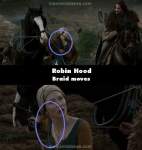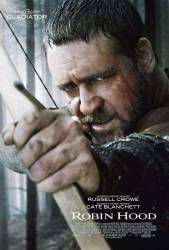Factual error: On the cliff top before the battle on the beach, you are treated to a lovely if fleeting glimpse of wind farm turbines, not really fitting for the 12th Century.
Factual error: In the beginning of the film, the opening text states that it is the turn of the 12th century. However, the first scene of the movie says that the year is 1199 A.D., which is the turn of the 13th century.
Factual error: Richard I was not fighting his way back across Europe following the Crusades when he was killed. He had already returned to England and put down John's rebellion before returning to France to put down rebellions there.
Factual error: The Viking style funeral that Robin's adopted father has would have been unthinkable at the time. Cremation wasn't just against the law, it was completely against the teachings of the Church. He would have been interred in the family crypt or, if that had been destroyed, buried.
Factual error: Richard, John and Eleanor are all addressed as "Your Majesty." Henry VIII was the first English king to use that form of address, in the 16th century. Medieval kings and queens were addressed as "Your Grace."
Factual error: Isabella of Angoulême, (whom John is seen with during their introduction in the film) is portrayed as being in her early twenties when in actuality, she was born in 1188 and would be only 11 years old during the events of the film.
Factual error: Nottingham was an important fortified city with a castle in the Middle Ages, not a small village as depicted.
Factual error: The French invade the lands of England by crossing the English Channel. The kings of England considered Normandy, Gasconie and Aquitane to be their primary lands up to defeats in the Hundred Years War, about 230 years after the movie takes place. French invasion of England would be illogical and impractical, if not downright suicidal. Not surprisingly, English holdings in France aren't mentioned as a target.
Audio problem: In the first shot of the small church in Nottingham, you can hear the bells ring. However, the bell on top of the church is not moving as it ought to be.
Revealing mistake: After the prince is crowned king, Robin and his mates leave the castle. If you look to the upper-right of the screen, atop a hill in the distance, you can see a modern-day metal telegraph tower (cinematic version).
Continuity mistake: On the beach after Robin kills Godfrey, he pulls Marian from the surf to save her and pushes her helmet off into the water, when he's walking up the beach with her in his arms, she has the helmet on again.
Factual error: The invasion was supposed to be at Dymchurch, as mentioned in the Blue Ray director's cut version. In the film, the invasion area is a sandy beach flanked by cliffs. In reality Dymchurch is a pebble beach and is on the edge of the Romney Marsh with no cliffs. The lack of cliffs can be checked via OS Maps of the area.
Continuity mistake: When the Sheriff reads the royal pronouncement decreeing Robin an outlaw to the citizens of Nottingham, he holds the top of the document with his right hand. He's then holding the top with his left hand, then back with his right again.
Revealing mistake: Early in the movie, as they are heading down to the beach in France to board the ship to England, a plane contrail is seen in the sky.

Continuity mistake: Marion is guiding a plow horse when a man comes to collect more tax. As she turns to tell him that her father-in-law is too poor to pay him, her long braid, which has been in front of her right shoulder, is now hanging behind her.
Continuity mistake: During the siege of Chalus Castle, a french cook aims a crossbow at King Richard the Lionheart. He holds it with his left hand in front and his right hand back on the trigger. A few seconds later, as the crossbow fires his right hand is now in front with his left on the trigger.
Continuity mistake: The Sheriff asks why Marion is treating him like an enemy when she knows that he wants her, and has just forcefully grabbed her. His right thumb is on her left cheek in medium shots and is missing in close-ups of Marion's face.
Suggested correction: I just watched that scene and there are two angles. One on Marion's face, the other on the sheriff's face. You can see the sheriff's thumb on Marion's face shot. His thumb can be seen briefly in the reverse angle.
Other mistake: The impression of Robin Hood's hands in cement, made as a child, match the size of his adult hands.
Suggested correction: There were two sets of handprints. The one on the left was that of a child. The one on the right was that of an adult. When Robin reopens the slab, the prints are covered in mud and debris. He runs his hand over the child print then puts his hand in the adult print of his dead father.





